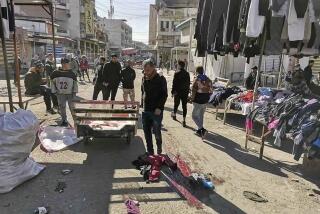Prime Minister Urges Unity, ‘Love’
- Share via
BAGHDAD — Iraqi Prime Minister Nouri Maliki pleaded for “brotherhood and love” to unite a splintered nation in the face of sectarian violence a day after dozens of Iraqis in the capital were slain execution-style in broad daylight.
But only hours before he spoke to the Kurdish regional parliament in the relatively safe northern Iraqi city of Irbil, two more bombs exploded within minutes of each other in Baghdad, raising the death toll to more than 70 since a sectarian rampage began Saturday night.
Meanwhile, Army Maj. Gen. William B. Caldwell IV conceded Monday that the deployment of 50,000 U.S. and Iraqi troops to secure the streets of Baghdad had fallen behind in its goal to restore order and that “we still have tremendous inroads to make in that area.”
The Monday morning bombings, which took place in an eastern section of the capital largely controlled by a Shiite Muslim militia, came on the heels of a weekend of bloody sectarian fighting that was gruesome even by Baghdad standards. According to police and witnesses, Shiite militiamen manning checkpoints in the religiously mixed Jihad neighborhood killed Sunni Arab motorists at point-blank range and dragged others from their homes before gunning them down. Sunnis responded by setting up roadblocks of their own, and a Shiite family of five was slain.
In his address to the Kurdish parliament, Maliki said reestablishing basic services, encouraging national reconciliation and rebuilding the security forces were the three steps needed to return stability to the country.
“We are not done yet facing the challenges,” he said. “Now many are falling in the streets and many innocents are being targeted, but I am sure we cannot be defeated.”
But on a day the prime minister attempted to project hope, the violence continued in Baghdad. A bomb exploded in a market area downtown, killing four and wounding 28 others, police said. Later in the day, Iraqi soldiers found three bodies on a bus parked along a road in the Amariya neighborhood. In the neighborhood of Dora, authorities imposed an afternoon and overnight curfew after clashes between residents and Shiite militiamen.
At a news conference Monday, Caldwell, the chief U.S. military spokesman in Baghdad, would not confirm which militia was believed involved in the execution slayings of Sunnis in the Jihad neighborhood over the weekend. Sunni leaders said it was the radical Shiite Al Mahdi army. The masked killers had virtually no opposition in the opening hours of their spree.
Al Mahdi army officials denied accusations that its members carried out the killings. But sectarian militias have been carving up Baghdad neighborhoods for weeks, killing some residents and causing others to flee their homes.
Caldwell, at a regular news briefing, said U.S. forces had hoped to be further along in securing the city’s streets. “We’re not there, but we’re moving along in a positive direction in many, many areas,” he said. “I think everybody had thought that perhaps it might be improving more than it is at this point.”
More to Read
Sign up for Essential California
The most important California stories and recommendations in your inbox every morning.
You may occasionally receive promotional content from the Los Angeles Times.













